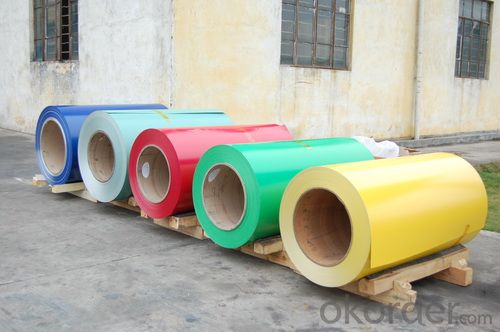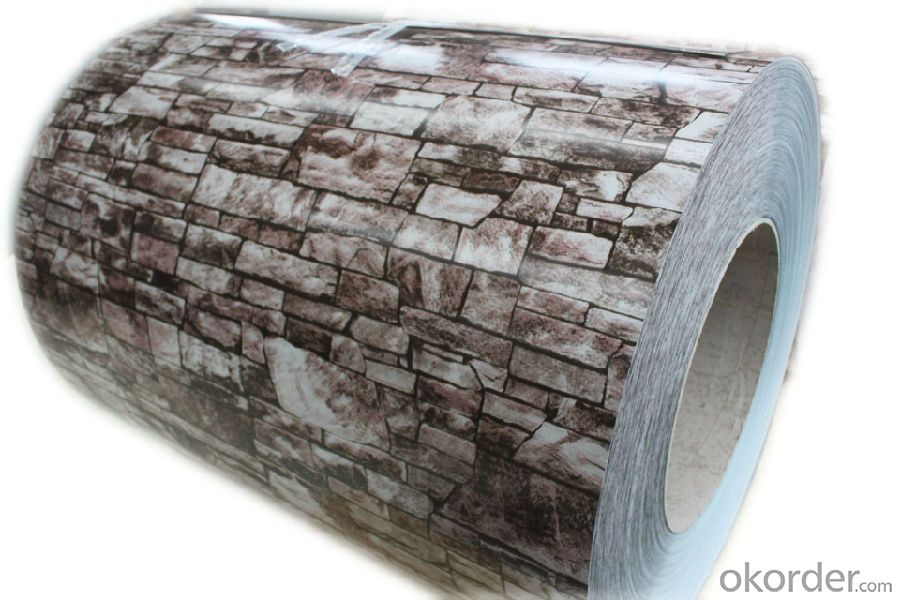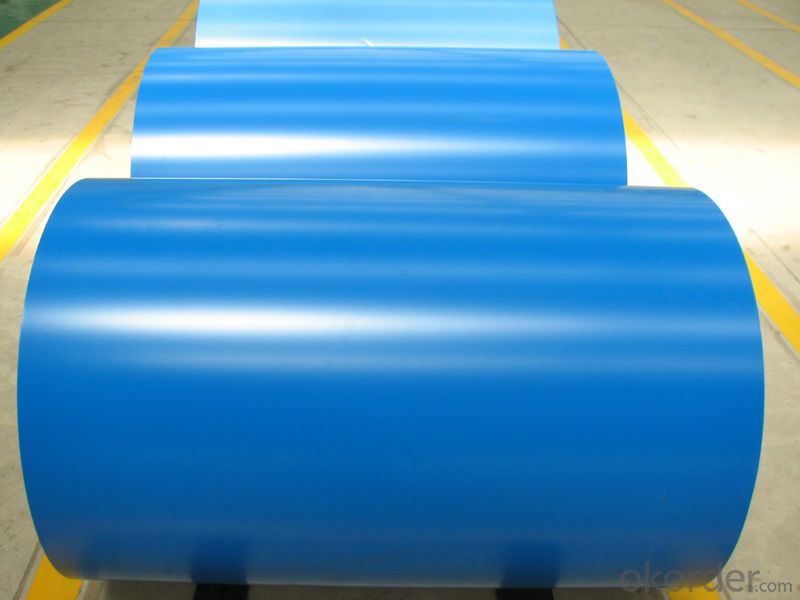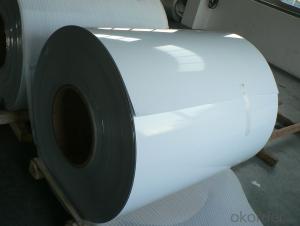White Color Coating Aluminum Coil with High Quality
- Loading Port:
- Shanghai
- Payment Terms:
- TT OR LC
- Min Order Qty:
- 5 m.t.
- Supply Capability:
- 10000 m.t./month
OKorder Service Pledge
OKorder Financial Service
You Might Also Like
Item specifice
1. Specification of White Color Coating Aluminum Coil with High Quality
Material | Alloy Aluminum 6063,6061,6005 or customer nominated |
Temper | T3, T4, T5, T6 |
Surface | Anodize, electrophoresis, powder coating, PVDF coating, wood grain painting, matted, etc. |
Colour | Any colour based on Standard Germany RAL Mark |
Length | Coating 6.5 meters, Anodizing 6.5 meters, Mill finish 5 meters |
Press Machine | 500-4000 tons all together 64 press lines. |
Fabrication | 1. Windows and doors; 2. Drilling; 3. Bending; 4. Cutting; 5. etc. |
Certificate | ISO 9001 |
Moulding | 1. Using our moulds, no fee; |
2. Using customer drawing, opening mould, usually about 10~50 tons then the moulding can be refunded. | |
3. Mould cost is negotiable base on the order quantity | |
Capability | Annual output 100,000 tons |
2. Application of White Color Coating Aluminum Coil with High Quality
(1).Interior: wall cladding, ceilings, bathrooms, kitchens and balconies, shutters, doors...
(2).Exterior: wall cladding, facades, roofing, canopies, tunnels,column covers , renovations...
(3).Advertisement: display platforms, signboards, fascia, shop fronts...
3. Feature of White Color Coating Aluminum Coil with High Quality
*Such coil is specially designed to replace aluminum ingot, due to the high export tax of aluminum ingot, the coil has better price than ingot.
*This type of coil can fit customer's remelting furnace just like ingot, no need to make any change to the production line that was previously used for ingot. The standard coil size and weight is very suitable for the feed gate of furnace.
*This type of coil causes less material wastage than ingot when remelted.
*Our coil is made directly from ore, no need to go though the ingot making process, quality is much better than other suppliers who use ingot scrap to make coil.
Be free from Oil Stain, Dent, Inclusion, Scratches, Stain, Oxide Dicoloration, Breaks, Corrosion, Roll Marks, Dirt Streaks and other defect which will interfere with use
4. Certificate:
SGS and ROHS(if client request, paid by client), MTC(plant provided), Certificate of Origin(FORM A, FORM E, CO), Bureau Veritas and SGS (if client request, paid by client), CIQS certificate
5. Image of White Color Coating Aluminum Coil with High Quality



6. Package and shipping of White Color Coating Aluminum Coil with High Quality
eye to wall
eye to the wall
with wood pallet (wooded case also available)
7. FAQ
1) What is the delivery time?
Dpends on actual order, around 20 to 35 days
2)What is the QC system:
We have QC staff of 20 persons and advanced equipment, each production is with MTC traced from Aluminum ingot lot.
3) What market do you mainly sell to?
Australia, America, Asia, Middle East, Western Europe, Africa etc
- Q:Aluminum inventory of the company, placed for a little longer, there will be surface oxidation, white spot shape, after cleaning into black spots, affecting the use of. Is there a better and convenient way to save it?
- 1. aluminum storage environment should be dry and bright, well ventilated, no corrosion climate.2. aluminum coil should try to avoid the leaks, snow.3. strengthen the management of rolling oil, its moisture content is controlled below zero point zero four percent.4. aluminum rolls should be packed in a sealed package and should be placed in the right amount of desiccant at the same time.5. do not immediately open the sealed package when it is transported from a low temperature zone into a region of high temperature and humidity.6. the humidity of the wooden shaft and box board of the packing box is not more than 18%, and the temperature of the color aluminum roll is not more than 45 degrees.7. aluminum rolls are prohibited from being stored with chemicals and moist materials during storage.
- Q:Can aluminum coils be used for solar panel applications?
- Solar panel applications can utilize aluminum coils, which are lightweight and durable materials commonly employed in solar panel construction. Aluminum, an excellent conductor of electricity, is ideal for capturing and conducting solar energy. These coils can serve as backing materials for solar panels, offering structural support and aiding in heat dissipation. Furthermore, aluminum possesses good corrosion resistance, a crucial characteristic for solar panels exposed to diverse weather conditions. Ultimately, the strength, conductivity, and corrosion resistance of aluminum coils render them a favored choice for solar panel applications.
- Q:high-quality hi-fi power and amplifiers generate large amounts of heat. to dissipate the heat and prevent damage to the electronic components, heat-radiating metal fins are used. would it be better to make these fins out of iron or aluminum? specific heat capacities for aluminum and iron are 0.89 J/degrees C.g and 0.45 J/degrees C.g, respectively. explain your answer
- Aluminum, it takes more energy (0.89 J vs. 0.45 J) to heat it up 1 degree Celsius per gram. For example, 1 Joule of energy would heat 1 gram Al only 1.x deg C, while Fe would heat up by more than 2. Might wanna throw in something about thermal conductivity k for some bonus points.
- Q:How do aluminum coils compare to other metal coils?
- Aluminum coils offer several advantages when compared to other metal coils. Firstly, aluminum is a lightweight material, which makes it easier to handle and transport. This characteristic also contributes to lower shipping costs. Additionally, aluminum coils have excellent corrosion resistance, making them suitable for various environments and applications. They are also highly malleable, meaning they can be easily bent and shaped without compromising their structural integrity. Moreover, aluminum coils have good thermal conductivity, enabling efficient heat transfer in applications such as HVAC systems. Finally, aluminum is a highly sustainable and recyclable material, making it an environmentally friendly choice. Overall, aluminum coils provide a cost-effective, durable, and versatile option compared to other metal coils.
- Q:How do aluminum coils contribute to the energy efficiency of products?
- Aluminum coils play a vital role in enhancing the energy efficiency of various products. To begin with, aluminum is renowned for its exceptional thermal conductivity, which facilitates efficient heat transfer. This characteristic enables aluminum coils to swiftly and effectively move heat between different components within a product, such as air conditioning systems or refrigerators. By efficiently dissipating heat, aluminum coils assist these products in operating more efficiently, reducing energy consumption, and ultimately saving costs for consumers. Furthermore, aluminum possesses the advantage of being a lightweight material, making it easier to incorporate into various products without adding unnecessary burden. This is particularly advantageous for industries like automotive and aerospace, where reducing weight is crucial for enhancing fuel efficiency. Through the use of aluminum coils in these applications, manufacturers can create lighter and more energy-efficient vehicles or aircraft, resulting in decreased fuel consumption and emissions. Moreover, aluminum coils offer exemplary resistance to corrosion. This is especially beneficial for products exposed to moisture or harsh environments, as it prevents rust and deterioration over time. By maintaining the performance and integrity of the coils, the overall energy efficiency of the product is preserved, ensuring optimal operation for an extended duration. In conclusion, aluminum coils make a significant contribution to the energy efficiency of products through their thermal conductivity, lightweight characteristics, and corrosion resistance. By effectively transferring heat, reducing weight, and preventing degradation, these coils facilitate the more efficient operation of products, leading to lower energy consumption, cost savings, and a reduced environmental impact.
- Q:What are the different coil cutting options for aluminum coils?
- Aluminum coils have various options for cutting, depending on the project's specific needs. Some common choices include: 1. Shearing involves using a shear blade to cut straight through aluminum coils. This method is ideal for thinner gauges of aluminum. 2. Slitting cuts aluminum coils into narrower strips by passing them through rotating circular blades. It is commonly used in industries like roofing, automotive, and packaging. 3. Cut-to-Length is a method where aluminum coils are cut into individual sheets of desired lengths. The process involves uncoiling, leveling, and cutting with a flying or stationary shear. This option is suitable for applications requiring precise sheet lengths. 4. Laser Cutting utilizes a high-powered laser beam to melt and vaporize the metal, resulting in clean and precise cuts. It is often used in aerospace and electronics industries for cutting complex shapes and patterns. 5. Waterjet Cutting involves using a high-pressure jet of water mixed with an abrasive material to cut through the coils. It is particularly effective for thicker gauges of aluminum without heat-affected zones or material distortion. These options provide different ways to cut aluminum coils. The choice of method depends on factors such as the desired end product, required precision, material thickness, and production volume. Considering the project's specific requirements is crucial in selecting the most appropriate cutting option.
- Q:How are aluminum coils used in the production of cans and containers?
- Aluminum coils are of utmost importance in the manufacturing of cans and containers. Typically, these coils are created by continuously casting molten aluminum into thin sheets. Once cooled and solidified, the sheets are rolled into coils, which are then utilized in diverse manufacturing procedures. The initial step in utilizing aluminum coils for cans and containers involves the process of blanking. During this stage, a blanking press cuts the coil into individual circular blanks, which will eventually form the bottom and lid of the can. These blanks are meticulously cut to the required size and shape, guaranteeing precision and uniformity. Following that, the blanks are transported to a cupping press, where they are situated between a set of dies. High pressure is applied by the press, causing the blank to adopt the shape of a cup. This cup will eventually serve as the body of the can or container. The cup is then transferred to a redraw press, where it undergoes a series of operations aimed at enhancing its shape and dimensions. This process aids in achieving the desired thickness and height of the can or container. Moreover, the redraw press ensures that the cup maintains its structural integrity and can endure the challenges of storage and transportation. Once the cup has been redrawn, it is subjected to a trimming procedure to eliminate any excess material and achieve the final shape. This step guarantees that the can or container possesses a clean and smooth edge, ready for further processing. Subsequently, the cups are conveyed to a base-coating station. At this station, a thin layer of protective coating is applied to both the interior and exterior surfaces of the cups. This coating helps prevent corrosion and ensures that the contents of the can or container remain fresh and uncontaminated. Lastly, the coated cups pass through a necking press, where the upper section of the cup is shaped into a narrower neck. This neck is essential for attaching the lid or cap to the can or container, providing a secure seal. To sum up, aluminum coils play an essential role in the production of cans and containers. They are transformed into blanks, cups, and ultimately into the final product through a variety of manufacturing processes. These coils guarantee the durability, functionality, and integrity of cans and containers, making them suitable for a wide range of applications in industries such as food and beverages, pharmaceuticals, and cosmetics.
- Q:What are the different types of alloys used for aluminum coils?
- Aluminum coils are commonly made using several different types of alloys. The most frequently used alloy for aluminum coils is 3003, which is known for its excellent corrosion resistance and moderate strength. It finds its application in roofing and siding where high strength is not a requirement. 5052 is another alloy that is commonly used for aluminum coils. This alloy possesses good weldability and formability, making it suitable for a wide range of uses. In the automotive industry, it is often employed for body panels and fuel tanks. 6061 is a popular choice for aluminum coils due to its outstanding strength. It is frequently used in structural applications, such as aircraft parts in the aerospace industry and structural components in the construction industry. Additionally, other alloys like 1100, 5005, and 8011 are also used for aluminum coils. Each of these alloys has distinct properties and characteristics that make them suitable for different applications. For instance, 1100 is known for its high electrical conductivity and is commonly used in electrical applications. On the other hand, 8011 is frequently utilized for packaging and food containers due to its excellent corrosion resistance. In conclusion, the various alloys used for aluminum coils include 3003, 5052, 6061, 1100, 5005, and 8011. These alloys possess different properties and characteristics, making them suitable for a wide range of applications across industries like automotive, aerospace, construction, and packaging.
- Q:Can aluminum coils be used for food processing conveyor systems?
- Yes, aluminum coils can be used for food processing conveyor systems. Aluminum is a durable and lightweight material that is resistant to corrosion, making it suitable for food processing environments. Additionally, aluminum is non-toxic and does not react with food, ensuring the safety and quality of the processed products.
1. Manufacturer Overview |
|
|---|---|
| Location | |
| Year Established | |
| Annual Output Value | |
| Main Markets | |
| Company Certifications | |
2. Manufacturer Certificates |
|
|---|---|
| a) Certification Name | |
| Range | |
| Reference | |
| Validity Period | |
3. Manufacturer Capability |
|
|---|---|
| a)Trade Capacity | |
| Nearest Port | |
| Export Percentage | |
| No.of Employees in Trade Department | |
| Language Spoken: | |
| b)Factory Information | |
| Factory Size: | |
| No. of Production Lines | |
| Contract Manufacturing | |
| Product Price Range | |
Send your message to us
White Color Coating Aluminum Coil with High Quality
- Loading Port:
- Shanghai
- Payment Terms:
- TT OR LC
- Min Order Qty:
- 5 m.t.
- Supply Capability:
- 10000 m.t./month
OKorder Service Pledge
OKorder Financial Service
Similar products
New products
Hot products
Related keywords




























